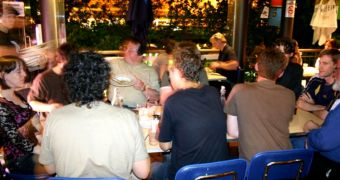A group of investigators from the Catholic University of Leuven in Belgium announces that consuming small amounts of bitter drinks before sitting down to eat may be a good strategy for better assimilating foods. It would appear that bitterness is responsible for boosting the production of hunger hormones.
Stimulating the appetite with drinks is not a new idea, but the new research adds to a growing body of evidence that demonstrates this habit is rooted in science. The investigation was conducted on gut cells of unsuspecting lab mice.
Whenever the Belgian team stimulated these gut cells with compounds that give foods and drinks their bitter taste, the cells started producing increased amount of a particular hormone associated with hunger, Science News reports.
Details of the new research appeared online yesterday, in the January 18 issue of the esteemed journal Proceedings of the National Academy of Sciences (PNAS).
In popular culture aperitif drinks are known to improve digestion. In the old days, it was a habit not to sit down at the dining table before consuming small amounts of such a drink. Because most such beverages contain the terribly-bitter compound quinine, their taste needs to be refined.
This is why they contain often-secret mixtures of spices and other herbs, meant to cover up the taste of the bitter compound. Whenever the chemical touches bitter receptors on the tongue, the production of the hunger hormone called ghrelin spikes.
In the studies conducted on mice, rodents exposed to bitter chemicals exhibited elevated levels of ghrelin, which made them go on a massive eating binge. However, they did not overeat, and then fasted for several hours, because of a delay that appeared in their digestive processes.
This may be a natural defense mechanism against overeating, researchers say. “Perhaps everything looks better when ghrelin levels are high – it stimulates you to eat food and then stop, perhaps preventing you from overeating,” says Inge Depoortere.
The expert, who is based at the Catholic University of Leuvenm was the leader of the new study, She holds an appointment as a specialist in gut-hormone physiology at the university.
Another interesting thing the scientists noticed was that the contractile muscles in the mice's stomachs were inhibited by bitter compounds. These muscles play a role in taking ingested food out of the stomach, and moving it into the intestines.
This may be a mechanism specific to mice, but on the other hand it may be a part of a larger phenomenon, regulating how food is absorbed in the body.

 14 DAY TRIAL //
14 DAY TRIAL //